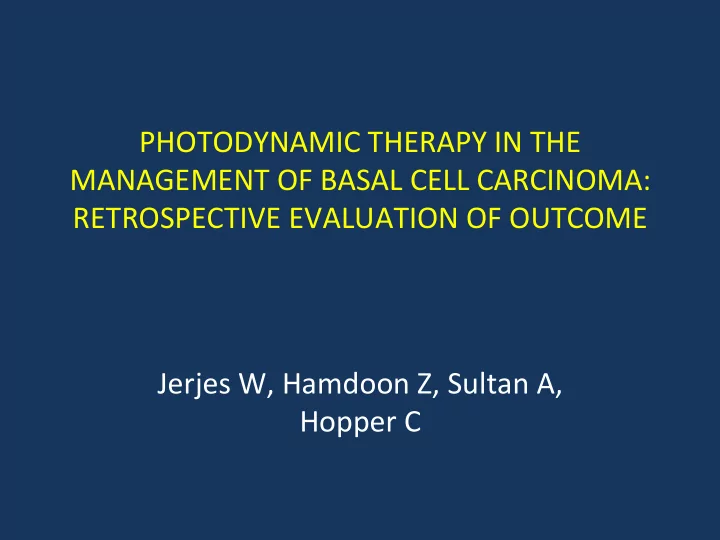

PHOTODYNAMIC THERAPY IN THE MANAGEMENT OF BASAL CELL CARCINOMA: RETROSPECTIVE EVALUATION OF OUTCOME Jerjes W, Hamdoon Z, Sultan A, Hopper C
PDT • A relaHvely new technique in managing Hssue pathologies. • We looked at the management of BCCs using this technology
ProspecHve study • 148 paHents with BCCs • Treated with surface illuminaHon 5-ALA-PDT or mTHPC-PDT • Comparisons were made with the - Clinical features - Rate of recurrence - Overall outcome were made
Parameters • Surface illuminaHon PDT was offered under local or general anaesthesia. • For thin BCCs ( < 1mm), 2% 5-ALA cream - applied topically. • For thick BCCs ( ≥ 1mm), 0.05mg/kg mTHPC - administered intravenously. • Lesion response evaluaHon was carried out according to RECIST.
RECIST at 4 weeks • Complete response (CR): disappearance of all target lesion • ParHal response (PR): at least a 30% decrease in the sum of the longest diameter (LD) of target lesion • Stable disease (SD): neither sufficient shrinkage to qualify for PR nor sufficient increase to qualify for progressive disease (PD) • Progressive disease (PD): at least a 20% increase in the sum of LD of target lesions
Day of treatment • Shielding of the macroscopically healthy surrounding Hssue. Safety margin of 2-3mm • The laser light delivery fibre (core diameter 400μm). The distance from the Hp of the fibre to the tumour surface is 5cm with up to 3cm spot diameter. • For 5-ALA-PDT, a single-channel 628nm diode laser was used for illuminaHon and light was delivered at 100 or 200J/cm 2 per site. • For mTHPC-PDT, a single-channel 652nm diode laser was used for illuminaHon and light was delivered at 20J/cm 2 per site.
Demographics • 86 males and 62 females • Mean age at the 1 st diagnosis was 56.3 years. • Chronic sun bathing was the most prominent risk factor (125 paHents) • 6 paHents reported problems with non-healing wounds. • The treated lesions : nasal area (n=46), upper lip (n=38), forehead (n=26), scalp (n=22). • Nearly one-third the cohort had history of BCC
Recovered Recovered
Conclusion • PDT achieved high efficacy in the treatment of BCCs with greatly reduced morbidity and disfigurement. • The technique is simple, can commonly be carried out in outpaHent clinics, and is highly acceptable to paHents.
Thank you • QuesHons?
Recommend
More recommend